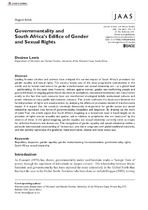| dc.description.abstract | Leading feminist scholars and activists have critiqued the current impact of South Africa’s provisions for
gender equality and sexual rights. The country boasts one of the most progressive constitutions in the
world, and its formal mechanisms for gender transformation and sexual citizenship are – at a global level
– pathbreaking. At the same time, however, violence against women, gender non-conforming people and
gays and lesbians or ongoing gender-based injustices in workplaces, educational institutions and many homes
testify to the fact that such measures have not transformed ideological beliefs, institutional cultures and
power relations in many public and domestic contexts. This article confronts the disjuncture between the
formal provision of rights and actual practice, by analysing the effects of provisions devoid of transformative
impact. It is argued that the country’s seemingly democratic arrangements for gender justice and sexual
citizenship reproduce new forms of governmentality, biopolitics and biopower. By drawing on the work
of Jasbir Puar, the article argues that South Africa’s imagining as a democratic state is based largely on its
provision of rights around sexuality and gender, and in relation to peripheries that are ‘measured’ by the
absence of these. In the global imagining, gender equality and sexual citizenship currently serve as tropes
for definitive freedoms and democracy. The recognition of gender equality and sexual citizenship ratifies a
particular international understanding of ‘democracy’, one that is congruent with global neoliberal standards,
and that actively reproduces the gendered, heteronormative, classist and racist status quo. | en_US |

